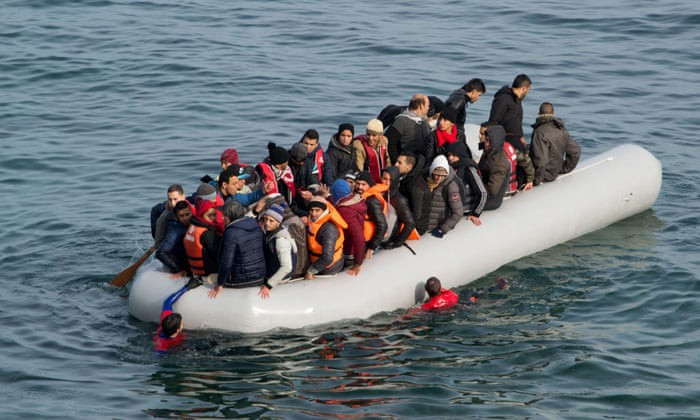
Migrants trying to cross the Mediterranean Sea (source: theguardian.com)
While European migrant crisis is a relatively new story for many, as the story was brought to attention by mass media in 2015, the story has actually begun in Tunisia in December 2010. Self-immolation of street food vendor in front of the government building has sparked series of revolts through the country resulting on collapse of the government. In the upcoming months the movement has spread through the Arab world and became known as "Arab Spring", alluding to the "Prague Spring" of '68.
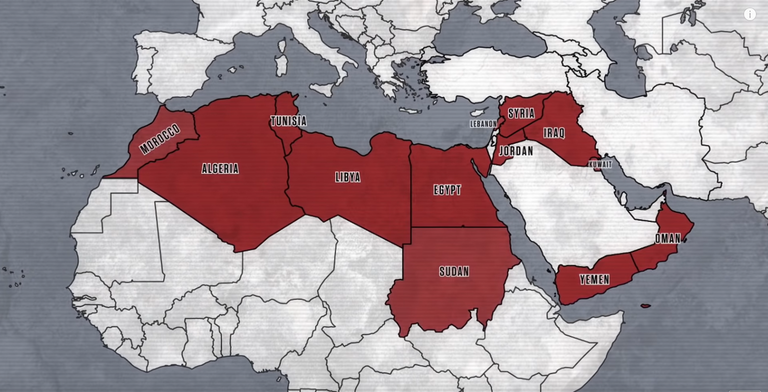
Social unrest in Arab countries in 2010/2011, known as "Arab Spring of 2011"
Series of protests and demonstrations followed by calls to topple the government has spread across the Arab world like wildfire. By the end of February 2012, rulers had been forced from power in Tunisia, Egypt, Libya, and Yemen; civil uprisings had erupted in Bahrain and Syria; major protests had broken out in Algeria, Iraq, Jordan, Kuwait, Morocco, Oman, and Sudan; and minor protests had occurred in Mauritania, Saudi Arabia, Djibouti, Western Sahara, and Palestine.
The end result of these revolts was civil war in Syria and Libya. Syria is now a rump state which was abandoned by more than 5M of its citizens, and Libya is a slavery and human trafficking hotspot.
The hunger games
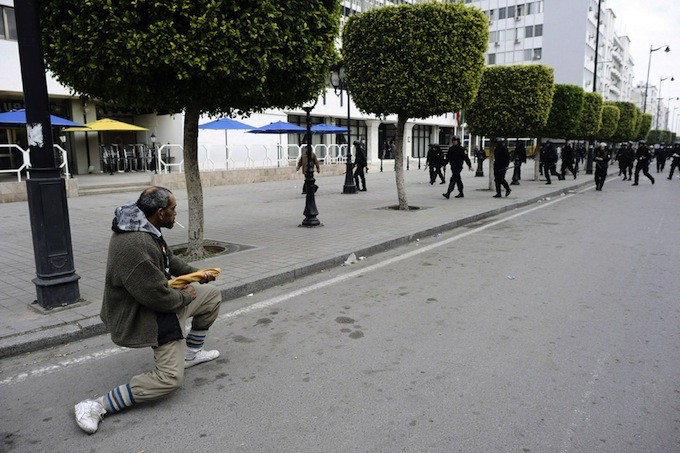
One of the most iconic scenes from the Tunisian revolution of 2010; "Baguette wielding hero"
Just a year before the Arab Spring, in 2008 and 2009 the world was struck by a deep financial crisis. Sudden system shocks like financial crisis usually wreak havoc in places which are not particularly stable even when things are "normal" in the world affairs. Tensions were already high in largely totalitarian Arab World; unemployment, lack of basic human rights and above all - hunger; have pushed people to the tipping point and made them take it to the streets. "Food riots" have started occurring all over North Africa during the 2010 and early 2001 [3][4], with tens of thousands protesting against inflating prices of food, notably bread. People in Arab countries have always relied on bread as a low-cost source of sustenance. In Yemen alone there are more than 20 different kinds of bread, each made and baked differently. In Egypt, bread is known as aish, meaning "life".
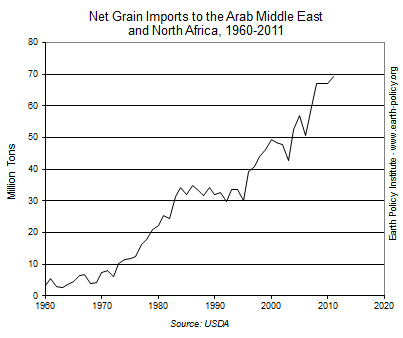
North Africa and the Middle East are worlds top food importing regions.
North Africa and Arab Middle East are world's largest food importers. With government of Egypt being sole biggest buyer of grain on the global market. When world wheat prices soared by 50 per cent in 2010, Egypt massively increased spending on the cereal to sell to its poorest citizens as subsidized bread. [4]
The Arab countries in the Middle East and North Africa make up only 5 percent of the world's population, yet they take in more than 20 percent of the world's grain exports. Imports to the region have jumped from 30 million tons of grain in 1990 to nearly 70 million tons in 2011. Now imported grain accounts for nearly 60 percent of regional grain consumption. With water scarce, arable land limited, and production stagnating, grain imports are likely to continue rising. - Earth Policy Insitute, 2012
Egypt is not only the largest importer of wheat but also the largest wheat consumer and bread eater per capita in the world. Provision of low-priced bread to the population is one of the cornerstones of the Egyptian state and a major factor in its domestic policy.
Egyptian government has been directly feeding its population with cheap bread at unrealistic (heavily subsidized) prices. Clearly the system worked and Egypt simply chugged along until black swan event of 2008 Financial crisis and skyrocketing food prices of 2006–2012.
A black swan is an unpredictable event that is beyond what is normally expected of a situation and has potentially severe consequences. Black swan events are characterized by their extreme rarity, their severe impact, and the widespread insistence they were obvious in hindsight. - Investopedia
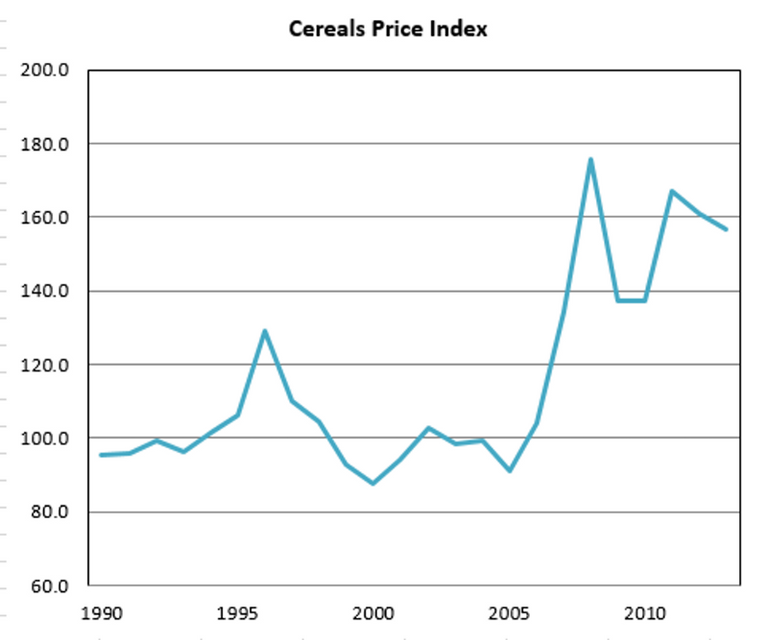
Cereal price index 1990–2011, FAO
When grain prices spiked in 2008–2010, Egypt's bread prices rose 37%. With unemployment rising as well due to financial crisis, more people depended on subsidized bread - but the government could not deliver it in quantities needed.
North African countries like Egypt, Tunisia and Libya were not struck hardest however. The heaviest blow was in the Levant, in ancient Syria. Some sources state that Syrian drought of 2006–2011 was hardest in last 900 years.
In the view of many Western policymakers and commentators, the Syrian civil war was caused, in part, by anthropogenic climate change. Former US President Barack Obama claimed that climate change-related drought 'helped fuel the early unrest in Syria, which descended into civil war' (Obama, 2015); former Secretary of State John Kerry argued that 'it's not a coincidence that immediately prior to the civil war in Syria, the country experienced its worst drought on record'
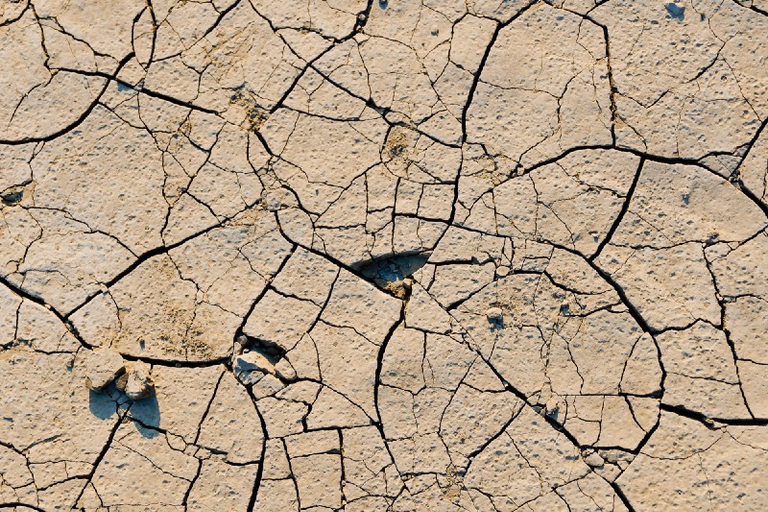
Photo by Anton Ivanchenko on Unsplash
While drought, as force majeure, does happen periodically; it always hits hardest at places which do not have technological advancements nor the efficient state apparatus of the state in order to handle it. One such place is Syria, where horrible mismanagement of water combined with climate change and drought has led to a full scale civil war.
There is evidence that the 2007−2010 drought contributed heavily to the conflict in Syria. It was the worst drought in the instrumental record, causing widespread crop failure and a mass migration of farming families to urban centers. Century-long observed trends in precipitation, temperature, and sea-level pressure, supported by climate model results, strongly suggest that anthropogenic forcing has increased the probability of severe and persistent droughts in this region, and made the occurrence of a 3-year drought as severe as that of 2007−2010 2 to 3 times more likely than by natural variability alone. - Climate change in the Fertile Crescent and implications of the recent Syrian drought : Proceedings of the National Academy of Sciences of the United States, vol. 112 no. 11, pp. 3241–3246
The butterfly effect
Wheat (Triticum aestivum L.) is the most important crop in the world in terms of area harvested, and is one of the world's staple foods. It provides about 20 % of the total dietary calories and proteins worldwide. [8]
However, wheat has a defect, each degree-Celsius increase in global mean temperature, on average, reduces the global yields of wheat by 6.0%. Other important cereals are also affected; rice by 3.2%, maize by 7.4%, and soybean by 3.1%. [7]
More than 40% of total wheat area in the world is affected by high temperature stress. [9]
Due to these facts, we can expect this kind of food "shocks" to be occurring more often and often as rate of climate change picks up.
In recent decade Russia has been the dominant supplier of wheat to Egypt, contributing the majority of the cheap wheat Egypt depends on. And in yet another turn of cosmic irony, Russia got struck by extreme drought in its most fertile regions in lower river Volga region and the Black Sea coast. In order to secure its own food supply, Russia has banned grain exports in 2010 - making Egyptian (and Arab) situation even worse.
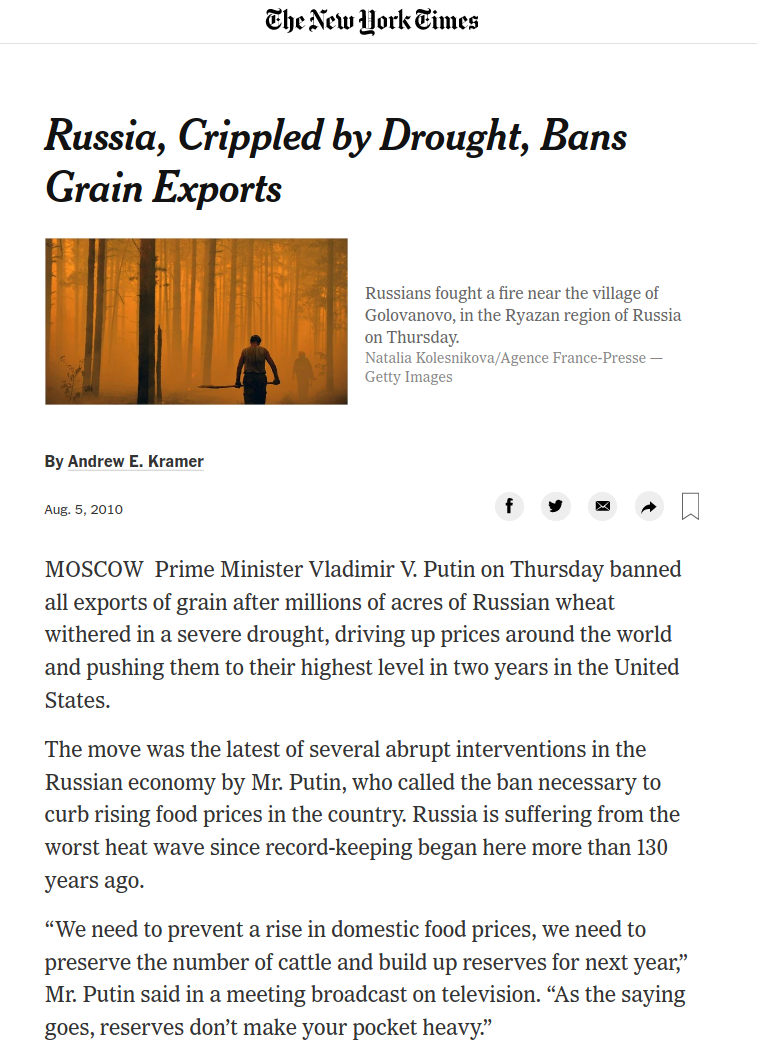
Russia has already proved that they will stop grain exports in order to secure its own food supply and keep the domestic prices stable. This year (2020) Russia has once again stopped all grain exports, fearing the unfavorable worldwide situation during the COVID-19 pandemic. [6]
With climate change putting the pressure on its domestic food supply, we can expect that Russia and its fertile neighbors like Ukraine to halt exports in times of systems shocks like pandemic or drought in order to secure food supply for domestic population - which will put more pressure on North African and Arab countries and their domestic food availability.
With more food pressure on the North African fragile states, we can expect more instability in the region and more and more people trying to cross the sea in hopes of getting to Europe. More migrants reaching the European shores will certainly cause the anti-migrant sentiment in Europe to rise, which could lead right-wing populist parties in power across the Europe. Which is not what we need, we need solutions and not cheap populism. Mass migration will not stop, there is simply too many hungry people living on our opposite shores.
Unforeseen consequences
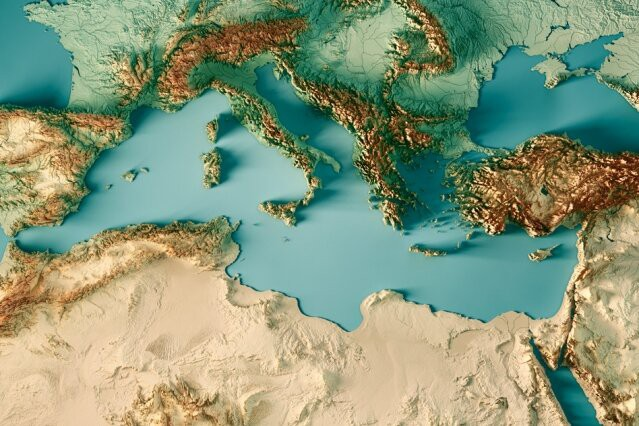
The Mediterranean Sea
I do not claim that civil war in Syria, and the European migrant crisis has stared solely because of the climate change. Effects of the climate change were the root cause of it though. People are not likely to revolt and tear down their own state if they can up bring their families and have sufficient food on their tables. People are not likely to decide to walk 3500 km from Syria to Europe if they can live decently at their homes.
Economy of the world is tightly-knit and fragile system with many cross-dependencies. As demonstrated by this text, a drought in Russia can topple regimes in North Africa and civil war in Syria can bring right-wing populists in power in Europe. Not that there is something inherently wrong with right-wing populists, just that they do not bring solutions but divide the society further.
Politics are not the solution, technology and careful resource management is. No amount of politics will undo the climate change and no amount of populism will stop the migrants from coming over.
Although global climate models vary in many ways, they agree on this: The Mediterranean region will be significantly drier in coming decades, potentially seeing 40 percent less precipitation during the winter rainy season. - Journal of Climate, 2020 [5]
Mediterranean region is going to be struck by climate change and it's going to be struck hard. We must start preparing for this, nobody is going to handle this situation for us. Remember that this is not the first time this has happened, do homework and read about "Bronze Age Collapse". [10]
By December 2017, the UNHCR counted 1,000,000 asylum applications for Syrian refugees in the European Union. As of March 2018, UNHCR has counted nearly 5.6 million registered Syrian refugees worldwide. [1]
References
https://data2.unhcr.org/en/situations/syria
https://www.bbc.com/news/world-africa-12134307
https://www.newscientist.com/article/dn20100-egypt-and-tunisia-rocked-by-the-global-food-crisis/
https://www.millermagazine.com/english/focus-on-egypt-grain-and-wheat-policy/.html
https://phys.org/news/2020-06-mediterranean-climate-hotspot.html